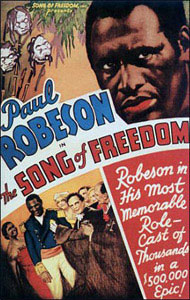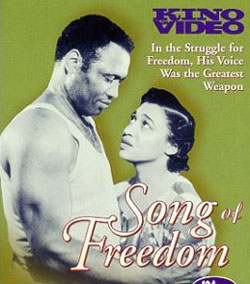 When Paul Robeson went to England, he was able to make several films which at least attempted to be respectful of his race, & provide him with starring roles worthy of his talent, as was not happening for him in his native land.
When Paul Robeson went to England, he was able to make several films which at least attempted to be respectful of his race, & provide him with starring roles worthy of his talent, as was not happening for him in his native land.
They were still films orchesterated by & large by white folks who had to turn a profit selling tickets to other white folks. The good intentions weren't always turning into inspiring films.
But had Paul only made Hollywood films he'd've had to have been satisfied with tokenism, momentary cameos, a segregated song interlude in a film he's not otherwise in, or learn to tapdance while swinging a rag to shine shoes.
Song of Freedom (1936) is a case in point. It really means the best. It's so kneejerk liberal it isn't even funny. How well it works is a matter of opinion, but as a candidate for the classics category, time hasn't borne it out as a success.
The tale opens in the early 1700s. The African queen Zinga (Cornelia Smith) is a "tyrant, despot, mistress of cruelty" on an off-shore island kingdom. Beset by mainland slave traders, Zinga really ought to have been depicted as a fierce protector of her people. Instead, she's depicted as a repugnant sadistic hag.
This unfortunate pulp fiction nightmare character was based on a real person of much more interesting merits. N'Znga M'Bandi of Angola (1582-1663) made ever effort to cement peace with the Portuguese. But like most Europeans with friendly treaties for "mere" black kingdoms, such was inevitably a delay tactic never intended to lead to mutual benefit.
She was betrayed by the Portugese, who despised her as the only sovereign who refused to provide human beings for the slave trade. She wouldn't even let the Portugese have captive enemies. For setting herself firmly against the slave trade, her nation was attacked.
N'Zinga led enormous armies, inflicting horrific losses on the Portugese, but it was still only spears against canons & the final outcome was not as much to her favor as would've been preferred.
Even with a title like Song of Freedom, a film by Brits who greatly favored the idea of their own Empire wasn't about to show this proto-nationalist warrior-queen as anything but a monster. So the story dishes up the most awful jungle-savage stereotyping, unique only in making the monster-savage female.
A young black woman escapes from the sinister clutches of evil Queen Zinga, assisted by Zinga's own son. They flee to the "safety" of a slave ship, as everyone knows slavery is the lesser of all evils.
Decades & generations pass, with the medalian of sovereignty passed down from Zinga's son through their enslaved lineage. Eventually there arose the generations of the freed blacks & at long last we until arrive at the modern age, in England.
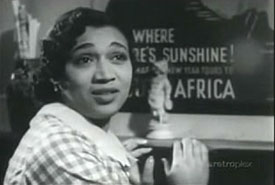 Dockworker John Zinga (Paul Robeson) is introduced to the tale singing the gospel number "Joshua at the Battle of Jericho." Dockworker John Zinga (Paul Robeson) is introduced to the tale singing the gospel number "Joshua at the Battle of Jericho."
A composer disembarking from a ship hears that incredible voice & attempts to follow the sound to its source, but on that first seeking cannot find the possessor of that golden voice.
The dockworker's wife Ruth (Elisabeth Welch, who is exquisite) knows her husband dreams of one day going to Africa. He has always longed to find out which was his exact tribe. It makes her sad that no matter how she tries to make a home, he'll never stop thinking of himself as an exile.
To cheer her up, John sings "Sleepy River" while the whole of the impoverished neighborhood listens.
His is a peaceable, working class, fully integrated neighborhood, & that is something you'll never see in any vintage Hollywood film. The pleasing assumption of Song of Freedom is that black & white live together & work together, drink in the same pubs, eat at the same tables -- a lovely fantasy for filmmakers to be taking for granted in a 1936!
At the local pub, John sings "Lonely Road," which begins "I been tramping all the day/ Underneath these clouds of grey." The composer who had failed to find the barer of that great voice the first time he heard it is passing buy, finding the singer at last.
Promising John a career & a future with that voice, he & Ruth are taken away from their working class world, into the world of the arts. He's soon touring Europe singing, or starring in the Eugene O'Neill play Emperor Jones which in real life Robeson actually did star in periodically, as early as 1923.
Song of Freedom even presents a scene out of Louis Gruenberg's musical version of the O'Neil play, the scene in the haunted woods, & it's very prettily done. And for encore, John sings "Song of Freedom" with such lines as "I hear the voice of my people."
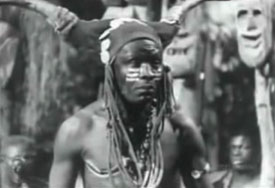 By a chance encounter he learns that the medallion he posses, passed through his family line, proves he's the direct descendant of the royal line of the island kingdom of Cazinga. By a chance encounter he learns that the medallion he posses, passed through his family line, proves he's the direct descendant of the royal line of the island kingdom of Cazinga.
The royal line was believed to have died out, & the people are now ruled by a sorcerer priest, another jungle-savage stereotype that spoils the good intentions of the filmmakers.
The story has been very beautifully done for its modern-day portion up to this point. But underlying the film's next turn is this conviction that African blacks can only sink into deeper & deeper ignorance without a royal head of state -- something only Brits with their monarchy could believe.
Yet we've already been shown that when they did have a royal head of state, she was an evil hag cruel to one & all. So the simultaneous assumptions is that Africans are just so inherently ignorant that with or without royalty, they're screwed.
But if John Zinga returns, he'll be coming to them with the missing ingredient: knowledge of real civilization, meaning European, & necessarily English speaking as well.
So the tale once again falls into unintentional racism when John reaches the land of backward savages whose leaders, royal or priestly, are invariably wicked & cruel.
The unfortunately named Mandingo (Ecce Homo Toto) is the first one who believes this westerner is their true king. For the good of the people Mandingo must help John overthrow the sorcerer-priest & take up the rule of a people he can't even talk to since he knows so few words in their language.
The script really never questions that it would be the right thing for a man who can't even speak the local language to be embraced as their soveriegn on the basis of the medallian. After all, the peoples' obvious inability to orchestrate their culture & society to any good would be swiftly repaired by the import of European taught them by a complete stranger who knows nothing whatsoever about them.
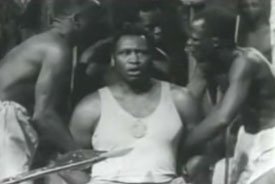 Endogo (James Solomon) the sorcerer-priest is the only person who questions this lunatic assumption, but he's the bad guy so his opinion doesn't count. He's not going to be displaced without violent complaint! Endogo (James Solomon) the sorcerer-priest is the only person who questions this lunatic assumption, but he's the bad guy so his opinion doesn't count. He's not going to be displaced without violent complaint!
We're in something of the opposite of the character Paul played on stage & in film, vis, Emperor Jones (1933), with John wanting to be their benevolent dictator, unlike Jones who just wanted to dominate & terrorize.
Instead of appreciating John's plan, the mean ol' iggerunt tribe imprisons him. Without moral scruples, they prepare to kill Ruth in front him for extra spite.
But when it turns out he actually does know the secret "King Song" passed down to children of his family tree as a lullaby, he gets to be Insta-King after all, though if only the king line knew the secret song, seems the evil sorcerer-king only had to say, "That's the wrong song," but apparently in fact everyone knew the secret song.
Then Ruth gets to reprise the song John had sung earlier, "Down the River of Dreams." Her husband is now the accepted king, so he returns to London & pursues his career seasonally as a singer & actor. This is to insure an inflow of money for all the great plans he'll be putting into effect on Cazinga, where he'll be hanging out as king during the off-season for entertainment.
copyright © by Paghat the Ratgirl
|
